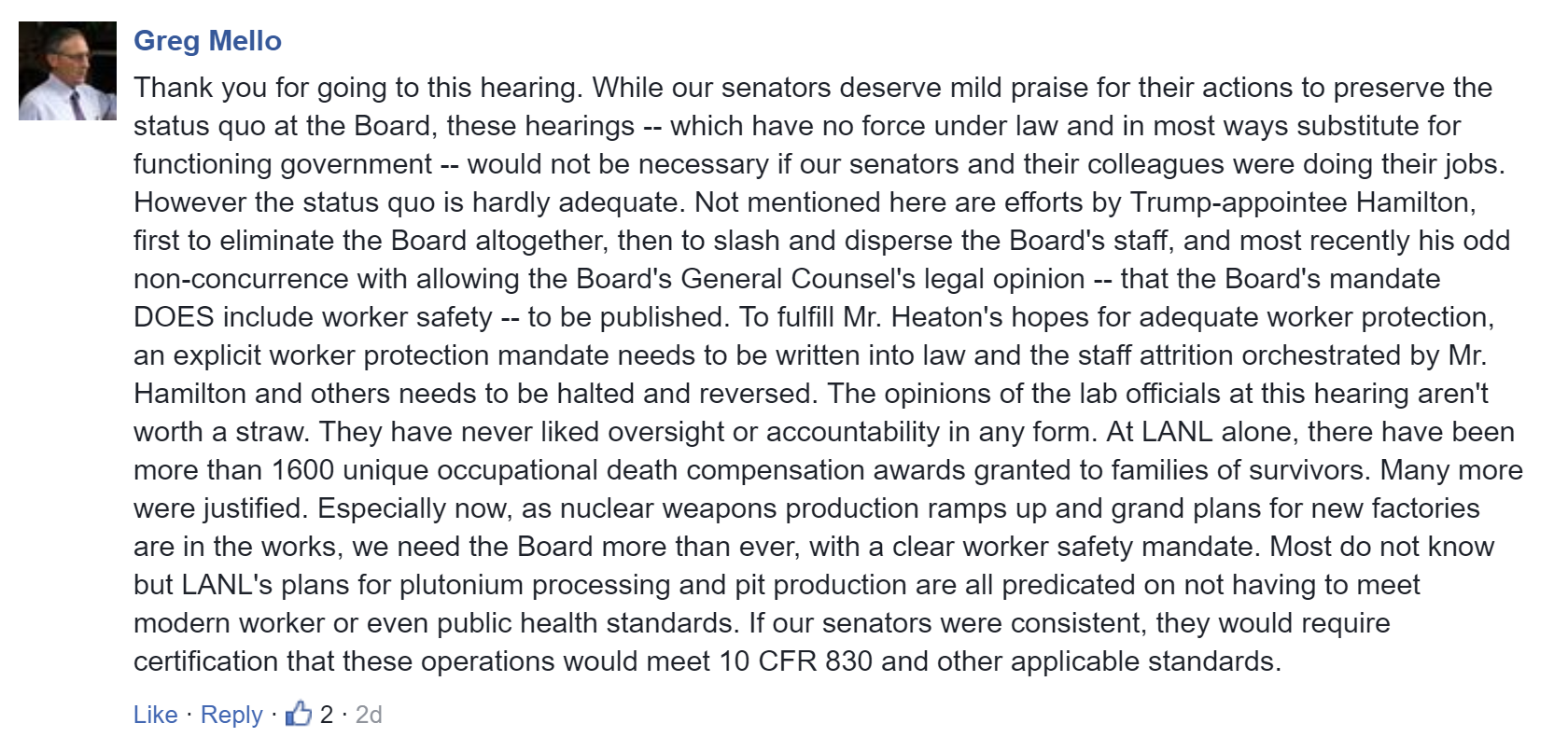Members of the public and a federal nuclear safety board voiced concerns this week that a U.S. Department of Energy order implemented in May excludes some facilities from the board’s oversight, creates obstacles to monitoring worker safety and allows private contractors to shield information from the public.
At a federal hearing on the order Thursday in Albuquerque, federal officials for the national laboratory defended the order, arguing the document has not significantly changed the relationship between the labs and the Defense Nuclear Facilities Safety Board.
But the document outlines unprecedented restrictions on the board’s access to information and oversight of nuclear sites and workers.
Thursday’s hearing was the last of three held to gather public comment on the order, though board member Daniel Santos said he would propose additional field hearings.
About 20 people spoke Thursday, many saying they were concerned in particular that staff of the safety board would no longer have authority to oversee the Waste Isolation Pilot Plant in Carlsbad, an underground nuclear waste storage site where a multibillion-dollar radiation leak occurred in 2014.
Many said the document should be suspended.
John Heaton, a former state lawmaker and chairman of the Carlsbad mayor’s nuclear task force, told the board, “It would be horrible to lose you.”
The board’s role in overseeing the safety of workers at WIPP was crucial, he said.
“The workers on site are very, very important,” Heaton said. “They are our friends, our neighbors; they are the people we go to church with, that we live with.”
The Defense Nuclear Facilities Safety Board was established by Congress in 1988 to provide independent advice to the energy secretary and the president on public health and safety at nuclear facilities. Its inception was largely born out of concern that the Department of Energy was operating with too much autonomy and too little transparency.
By statute, the board was granted powers of investigation and nearly unrestricted access to information.
While the board’s legal counsel has maintained that public safety includes the welfare of nuclear workers, and that concern for worker safety in part prompted the establishment of the board, the Department of Energy’s order appears to walk back the breadth of the board’s role in ensuring safe working conditions.
The order limits the board’s oversight to only the highest-level nuclear facilities with specific safety controls. This excludes 71 percent of the facilities the board previously monitored, including facilities where an accident would harm workers but not the public. WIPP would be removed entirely from its oversight.
And the order gives the Department of Energy the authority to exclude the board from the early stages of decision making.
George Anastas, former president of the Health Physics Society, was among those testifying Thursday night. “The order makes it so very easy for DOE and its contractors to hide information — facts hidden in the shadow they do not want to come to light,” he said.
Lab officials pushed back against opposition to the order, saying it has little effect on the board’s role.
“I have seen the communication from the lab staff, senior staff, that basically says we are not going to be changing the way we do things,” said Jeffrey Harrell, Sandia Field Office manager for the National Nuclear Security Administration.
Steve Goodrum, who holds the same role at Los Alamos National Laboratory, said he has worked with the safety board since the ’90s, “and when I look at the new order, I don’t see things that fundamentally change the role and relationship.”
The board’s technical director, however, provided examples of how the Los Alamos lab has used the order to redact information from a public report and to delay or deny information requests.
Board member Joyce Connery said federal officials might have intended to continue to provide open access to facilities, but “the words on the page do not reflect the words of some of our colleagues,” creating confusion and allowing wide interpretation of the order.
Connery said she intends to abide by the board’s establishing statute, not the Department of Energy’s order.
Board Chairman Bruce Hamilton echoed those thoughts.
“We have heard repeatedly from DOE representatives that they really don’t mean what they wrote, or at least they really don’t intend to follow what they wrote,” Hamilton said. “Not only is this a curious position coming from representatives of our government, it is a particularly bizarre argument coming out of the nuclear culture that has the standard for following the written rule to the letter.”
In an email Friday, U.S. Sen. Tom Udall, D-N.M., said he shares the public’s concerns about the order, and argued that the Department of Energy needs to provide better answers to the public and to Congress.
“Congress has already expressed our unease with the broad implications of this order,” he said.
“Senator [Martin] Heinrich and I requested this public hearing” to be held in New Mexico, Udall added, “and we will continue to work in Congress and explore all options to ensure the DOE is transparent with the public, and that the DNFSB can continue its essential mission with the independence and information needed to conduct effective oversight at New Mexico’s national labs and at WIPP.”

